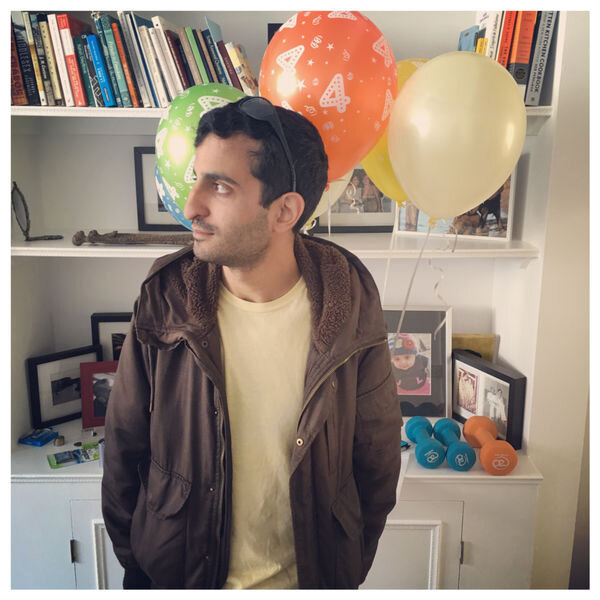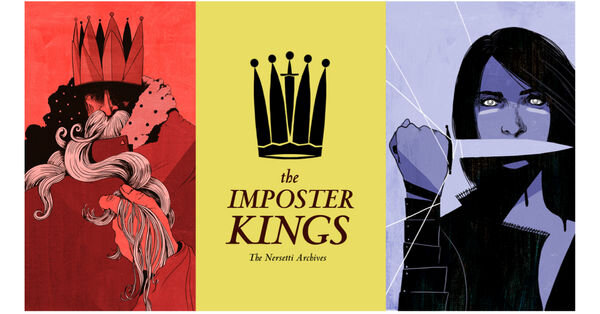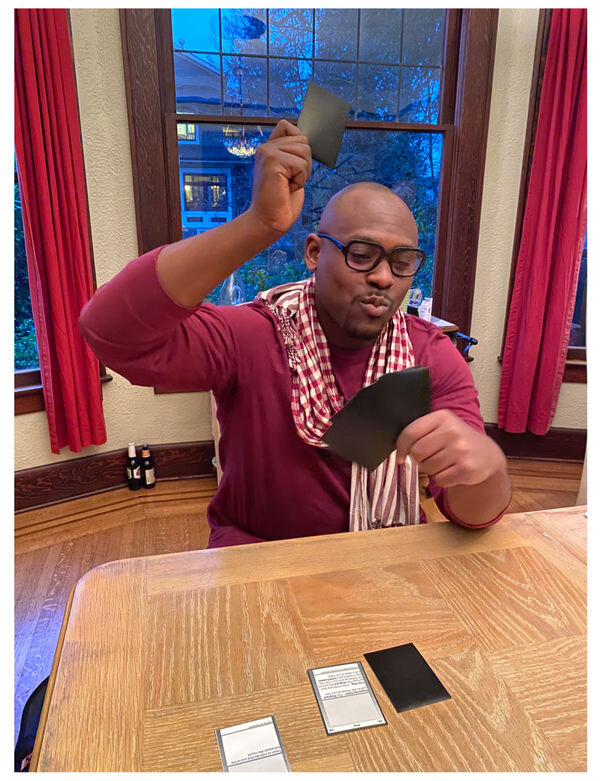Tell us about yourself – Who are you? What do you do?
Hi! I’m Sina, and I’m the creator of The Imposter Kings. I live in Seattle, WA, and am passionate about games and education (ideally both at the same time)!
For work, I’m a Product Manager for a really cool tech startup called Apptentive. One reason why I bring this up is that Apptentive is all about customer love. For me, ANY feedback is a huge part of game design, and The Imposter Kings was actually a prototype that I started around a year ago. Ever since then, a core aspect of the game design is to test and gather feedback almost nightly, even today!
If I’ve never played your games before, what’s the first one I should try?
This is my first published game, so I’d be humbled if you try this one :)! There are a couple of other games that I have been working on the side, but I am currently only testing with family and friends at the moment.
That being said, there are print and play prototypes available on the Kickstarter for this game, and if you email me and let me know you read this interview, I’d gladly share with you the full prototype and/or online test versions of the game!
One fact that we probably don’t know about you:
I proposed to my wife by creating an original murder mystery. The first part was a mystery and games, and the second part was scripted. She said yes, only after asking if it was real.
What games are you playing most right now?
My lovely wife, Alissa, and I just finished a game of the new Eclipse (2nd Edition). It was fantastic, as I’ve always loved the design of that game (once you get it set up). There’s just SO much you can do, while still being super streamlined and informative to the player.
Other than that, we still play The Imposter Kings nightly. I can say she continues to beat me at my own game.
What are your all-time favorite games?
Android (board game and netrunner!), Mage Knight, Twilight Struggle, Eclipse, Codenames. I have a lot of respect for Vlaada Chvatil, who made Mage Knight, Codenames, Space Alert, and Galaxy Trucker (what a variety of games!).
What draws you to make games?
There’s an immense passion for undertaking a creative project like making a game. The first game that I designed entirely is called “Blue Sun,” and it’s prompt for me was “Can I make a head to head battle game that is strategic, tactical, and under an hour once you know the rules?” Of course, there are many great war games like Battlelore and Eclipse, but I created my goals, and through prototyping early, I found energy with every playthrough to make it better.
For The Imposter Kings, it was the same process. I made the game prototype in less than three days and stuck with the same principles and prompts, just like my previous projects. Can I do a project that:
1) Minimizes luck, but reward risks
2) Give all players a lot of choices
3) Is Easy to pick up; hard to master
Through constant iteration and these principles, we’ve made a fantastic game that is quick to play and feels impactful regardless of the hand you’re given. My favorite playtest sessions are the ones where we test different scenarios. One example is that we would play a game, then after someone would win, we’d take back the cards and play the exact same game and see if a different decision would change the outcome as a metric of giving players satisfactory choices, no matter their draw.
How did you get started making games? Describe your process (or lack thereof) when making games. How do you reach your final product?
As I mentioned above, it really starts with a prompt. From there, I enter a creative brainstorming mode, where I begin to stay up late at night and just throw together a prototype as quickly as possible. Initially, the game I build is profoundly broken and not well thought out. By prototyping over and over again, and playing with my very patient friends and family, I start ironing out details while staying true to my objectives for the game. It’s a flywheel effect as I keep being more and more excited by what I’ve learned over the playtests, and as new ideas make the game better (or worse, but then they get weeded out later). It’s an enriching process at the end. My favorite quote was from a highly cynical friend who said: “Wow, this is actually really fun… I can’t wait to play it again!”
How do you market your games?
Marketing is extremely tough for me. On the one hand, effective marketing is getting people to notice your game. On the other hand, there are a couple spam tactics and price manipulation that work exceptionally well and hurt the more ethical game designers. It’s hard to be discovered in this world without either knowing a lot of people or using these tactics, and it makes me sad to see extremely talented designers (way more talented than me) not get the recognition they deserve. So it’s a mix of being ethical while getting out there and being noticed by others (radiating passion for your project helps!)
That being said, my favorite form of marketing is actually just going to local game shops and sitting at a table to play a game with a friend. Often, people will come over and check out the game, and my favorite backers are the ones who really enjoyed the game and wanted to be a part of the experience. A couple of local stores have been interested in carrying my games after I reached out to them. Everyone is super supportive if you’re willing to put in the legwork and reach out. My marketing method is mostly networking through friends of friends, rather than using strictly social media. I really like my game, and think others like it too when they play it, so if I can get copies in people’s hands, I’m sure it’ll be successful. During this pandemic with COVID-19, I lost a lot of opportunities to go out and share around. However, thanks to many tools out there, I’m already working on a Tabletop Simulator version, Tabletopia version, and even an app, so people can still play and be connected during these difficult times. Video promos and artwork ads are always great to have, and are rewarding in their own right.
As a funny anecdote, I’ve also been playing some competitive video games like Dota and Rainbow Six Seige. As part of the game, I’m usually paired with four teammates I don’t know, and I often joke around about how if I do well, they should look at my Kickstarter. I have approximately three of my backers as random people I met playing games on the internet. It never hurts to tell the world about your passion!
What game-related or game business-related media do you consume on a regular basis?
Honestly, mostly just Board Game Geek and r/boardgames on Reddit. I don’t consume as much media as I would like, but I am always looking for podcasts in my spare time (other than Critical Role, which is fantastic!)
What are some tool/programs/supplies that you wouldn’t work without?
My paper cutter has done a LOT of work, especially with continuous playtesting and sending prototypes to friends willing to test it out. Other than that, nanDeck and other software can be helpful for cards, a printer always lets me print things out, and other games provide me with components for early prototyping. I think I’ve mentioned prototyping maybe 100 times already, but it really is vital to me as a designer, so these tools help me immensely. Card sleeves are a must when you’re shuffling all day!
What’s your playtesting philosophy? How often/early do you playtest? How do you find playtesters?
I think I’ve touched a lot of on my philosophy. I have a couple different playtest groups. First, I usually try prototypes with close friends and family who are board game friendly. After the first couple of refinements, I then present it to a more diverse group of friends. There are so many game personas, and it’s fun to see how different types of gamers play the game (chaotic/anarchs, rules oriented regardless of me saying it’s just a typo, social gamers, former chess players, etc.). After that phase, I tend to go to local game shops and see if anyone is interested in playing games.
Finally, I ALWAYS set aside a group of board game friends as my “final draft test group.” As I finish the game manual and rules, I give them a prototype and observe them playing (without saying anything or clarifying rules), and see how well the prototype is for people who have never seen the game before. I always recommend you keep a couple of friends in the dark so you can see how much sense your game makes with a fresh pair of eyes. I miss a lot of things I usually wouldn’t catch with my blind test group
Playtesting!
What are some of the biggest obstacles you’ve faced in your work, and how have you overcome them?
When you design a game, there are so many components to think about, and a lot of logistics (finance, production, artwork, fulfillment, etc.). For artwork, I am fortunate that I was able to find the fantastic Michael Hirshon , who has been beyond helpful and fun to work with. For me, having a partner and friends who are willing to validate ideas is extremely important, and a lot of people have stepped in to fill that role.
How do you handle life/family/work balance?
It’s hard. Passion is immensely important to keep motivation. If you lose love or hope for the game, it’s going to impact your game. For me, thinking about the game’s marketing or finances is not fun. Prototyping and playing the game is fun. So I try to make sure I balance the three things so I can make sure that I’m still passionate and motivated.
What one piece of advice would you give aspiring game designers?
Would it surprise you if I said prototype early and often? I’d also say that creating games is not easy, and the market is super unforgiving. If you can, make it a passion project that you’re in love with. If you’re not in love with it, then it’s going to be hard to take it the entire way.
Who would you like to see answer these questions?
Hmm, probably Vlaada Chvátil or Kevin Wilson. They’ve both amazed me as game designers, and answers to these questions would be amazing to hear from them.
What’s the best advice about life that you’ve ever received?
If you’re not passionate about it, then don’t do it. Life is too short to do something you don’t love. I wouldn’t recommend you immediately quit your job or force yourself to love something, but I think the best thing I heard was to set a goal and figure out how to reach it. It’s ok to step back sometimes or re-assess the goal, but having a goal that you can drive towards gives meaning and purpose to your hobbies and work.
(Meta question: What question did I miss that I should have asked?)
These are great questions! I think the one thing that could’ve been interesting is talking about design philosophy itself. Something like “What is a game that you love for its design, and what makes it good?” (We’ll have to do a Part 2 sometime where we discuss this more, Sina!)
I’d also always love the “Is there anything else you’d like to add,” where I would just simply say – I’m always interested in having conversations about games in general or The Imposter Kings. If anyone has any questions or thoughts, feel free to reach out at sina@imposterkings.com.
Thank you so much for your insight, Sina! You can find his complete profile on Board Game Geek or
follow him on Twitter.
If you’re interested in how video games are made as well, check out our designer interviews at Doubtful Games!



